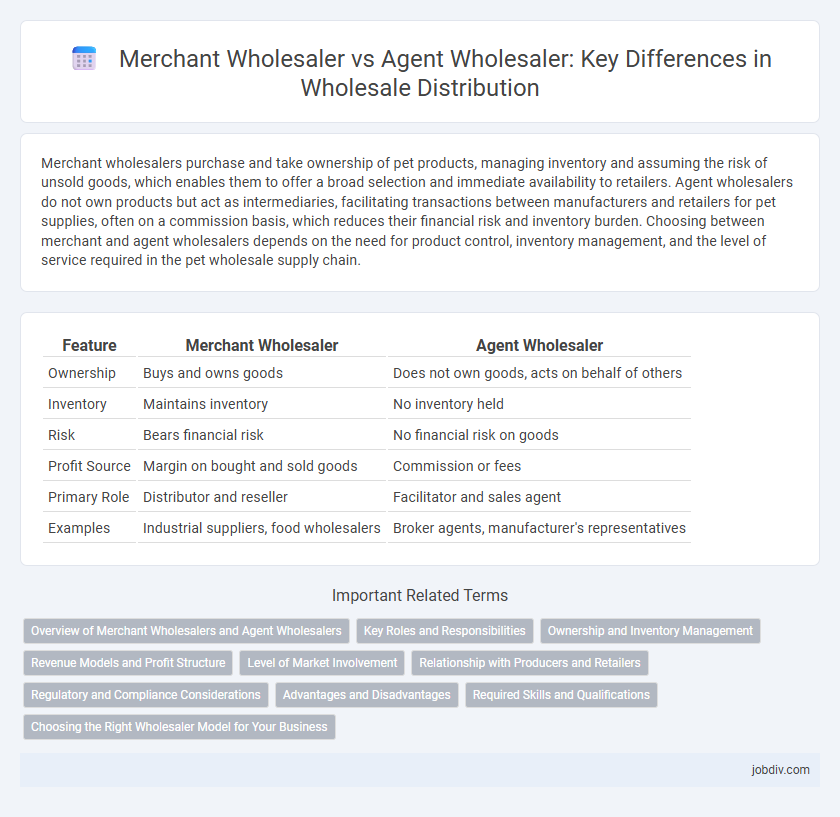Merchant wholesalers purchase and take ownership of pet products, managing inventory and assuming the risk of unsold goods, which enables them to offer a broad selection and immediate availability to retailers. Agent wholesalers do not own products but act as intermediaries, facilitating transactions between manufacturers and retailers for pet supplies, often on a commission basis, which reduces their financial risk and inventory burden. Choosing between merchant and agent wholesalers depends on the need for product control, inventory management, and the level of service required in the pet wholesale supply chain.
Table of Comparison
| Feature | Merchant Wholesaler | Agent Wholesaler |
|---|---|---|
| Ownership | Buys and owns goods | Does not own goods, acts on behalf of others |
| Inventory | Maintains inventory | No inventory held |
| Risk | Bears financial risk | No financial risk on goods |
| Profit Source | Margin on bought and sold goods | Commission or fees |
| Primary Role | Distributor and reseller | Facilitator and sales agent |
| Examples | Industrial suppliers, food wholesalers | Broker agents, manufacturer's representatives |
Overview of Merchant Wholesalers and Agent Wholesalers
Merchant wholesalers purchase goods in bulk directly from manufacturers and resell them to retailers or businesses, taking ownership and responsibility for inventory management. Agent wholesalers act as intermediaries without owning the products, facilitating transactions between buyers and sellers while earning commissions or fees. Both play crucial roles in supply chains but differ significantly in inventory control and financial risk allocation.
Key Roles and Responsibilities
Merchant wholesalers purchase, store, and resell goods directly to retailers or industrial users, assuming ownership and bearing inventory risks, while managing logistics, warehousing, and customer credit. Agent wholesalers do not take ownership but act as intermediaries, facilitating sales between manufacturers and buyers, earning commissions without holding inventory or handling distribution. The core distinction lies in merchant wholesalers maintaining inventory and risk, whereas agent wholesalers focus on market representation and negotiation.
Ownership and Inventory Management
Merchant wholesalers take ownership of goods and manage inventory by purchasing products in bulk to store and resell to retailers or other businesses, ensuring direct control over stock quality and availability. Agent wholesalers do not own the products but act as intermediaries, facilitating sales between manufacturers and buyers while leaving inventory management to the manufacturers. Ownership distinction directly impacts inventory risks, with merchant wholesalers bearing full responsibility for stock, whereas agent wholesalers avoid holding inventory.
Revenue Models and Profit Structure
Merchant wholesalers generate revenue by purchasing goods in bulk from manufacturers and selling them to retailers or other businesses at marked-up prices, benefiting from inventory ownership and volume-based profit margins. Agent wholesalers typically earn income through commissions or fees as intermediaries without taking ownership of the products, resulting in lower operational risks but narrower profit structures. The profit structure for merchant wholesalers is heavily influenced by inventory turnover and pricing strategies, whereas agent wholesalers rely primarily on transaction volume and commission rates.
Level of Market Involvement
Merchant wholesalers assume full ownership of goods and maintain inventory, enabling direct control over sales and customer relationships. Agent wholesalers do not take title to merchandise but facilitate transactions between buyers and sellers, typically operating with lower market involvement. The higher level of market involvement by merchant wholesalers allows for more direct influence on pricing and distribution strategies within the wholesale supply chain.
Relationship with Producers and Retailers
Merchant wholesalers buy and take title to goods from producers, maintaining inventory and selling directly to retailers, which strengthens their independent relationship with both parties. Agent wholesalers do not own the products but act as intermediaries, facilitating transactions by representing producers to retailers without holding inventory. This key difference influences control over pricing, risk management, and the nature of communication channels within the supply chain.
Regulatory and Compliance Considerations
Merchant wholesalers assume ownership of goods and must comply with comprehensive regulatory requirements including product safety standards, inventory controls, and tax obligations. Agent wholesalers, acting on behalf of principals without owning inventory, face distinct compliance issues such as contract enforcement, licensing mandates, and fiduciary duties under commercial law. Regulatory agencies monitor merchant wholesalers more intensely due to their asset holdings, while agent wholesalers are scrutinized for adherence to broker-specific regulations and transparency in transactions.
Advantages and Disadvantages
Merchant wholesalers own the goods they sell, allowing them to control inventory and provide faster fulfillment, but they require significant capital investment and carry higher financial risk. Agent wholesalers do not take ownership of the products, reducing overhead costs and financial exposure, yet they have less control over inventory and rely heavily on commission-based income. Choosing between the two depends on business goals, with merchant wholesalers suited for companies prioritizing control and agents fitting those seeking lower risk and operational flexibility.
Required Skills and Qualifications
Merchant wholesalers require strong inventory management skills, financial acumen, and the ability to negotiate directly with suppliers to maintain stock and pricing competitiveness. Agent wholesalers need excellent communication skills, deep industry knowledge, and expertise in building client relationships to effectively broker deals without holding inventory. Both roles benefit from proficiency in market analysis and sales strategies, but merchant wholesalers emphasize operational capabilities, while agent wholesalers focus on networking and negotiation.
Choosing the Right Wholesaler Model for Your Business
Merchant wholesalers purchase goods in bulk and take ownership, offering inventory control and warehousing, ideal for businesses seeking direct product management. Agent wholesalers facilitate sales between manufacturers and buyers without owning inventory, providing cost-effective, flexible solutions for companies prioritizing lower overhead. Selecting the right wholesaler model hinges on factors like control preferences, capital availability, and supply chain goals to optimize efficiency and profitability.
Merchant Wholesaler vs Agent Wholesaler Infographic

 jobdiv.com
jobdiv.com